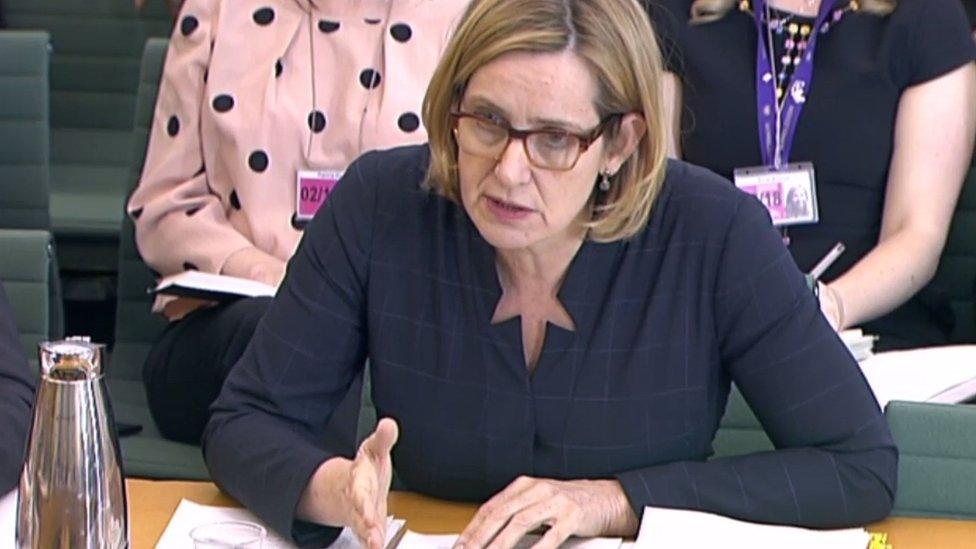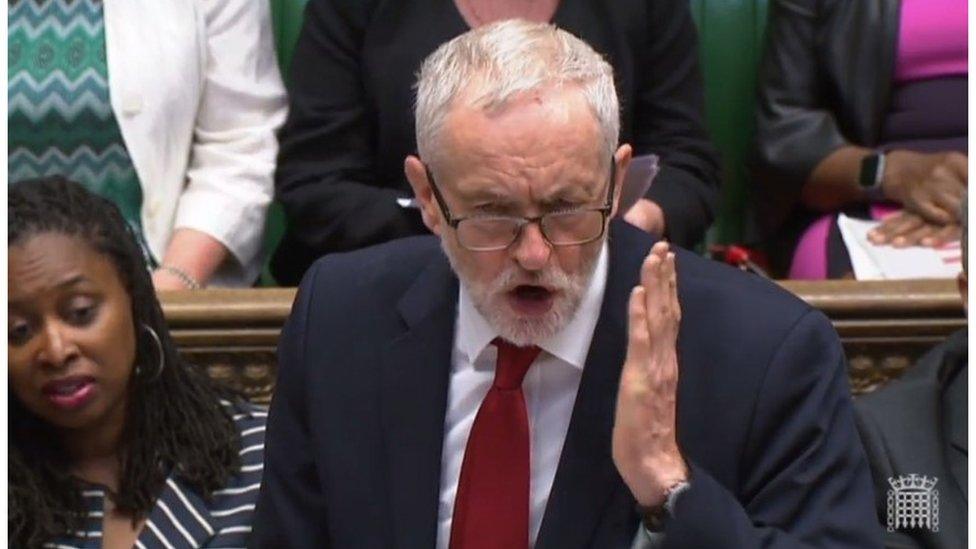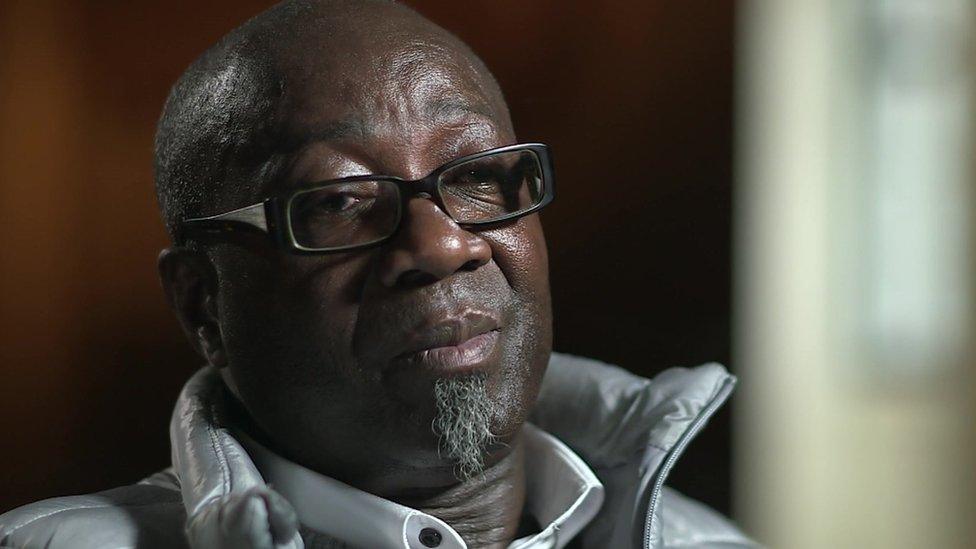Windrush: Home Office 'to scrap immigration removals targets'
- Published
Amber Rudd rejects calls to quit over Windrush scandal
The Home Office is to axe immigration removal targets - a day after Home Secretary Amber Rudd said they did not exist, the BBC understands.
Ms Rudd told MPs investigating the Windrush scandal on Wednesday targets were not set for immigration officials.
But after fresh evidence emerged overnight she was forced on Thursday to admit to MPs that "local" targets for "internal" use had been set.
The Home Office is now scrapping them, the BBC's Laura Kuenssberg understands.
The instruction to axe the targets is likely to be sent out from Immigration and Enforcement, a division of the Home Office, in the coming days.
However, the government's overall target of reducing net migration to under 100,000 a year will stay in place, the BBC's political editor said.
The home secretary faced fresh calls to quit following her admission that the targets did exist and, according to union officials, are prominently displayed on posters at regional immigration centres.
In a separate development on Thursday, she appeared to cast doubt on the government's policy of not being in a customs union with the EU after Brexit - although she later said she "should have been clearer" that "we will be leaving the customs union".
Ms Rudd said she had not been aware of the immigration removal targets but Labour's shadow home secretary Diane Abbott said she was "trying to blame officials" and the "direction will have come from the centre".
Ms Abbott said she did not see how Ms Rudd could survive in her job "unless she is only there as a human shield for Theresa May".
Asked how the targets had impacted on Windrush migrants, Ms Abbott said: "Immigration officials may have been looking for soft targets in the shape of West Indian pensioners who don't have hot shot lawyers."
Her Labour frontbench colleague, Dawn Butler, told the BBC's Daily Politics Mrs May was "presiding over a government that has policies that are institutionally racist".

Rudd breaks with May's approach
By Laura Kuenssberg, BBC political editor
What is remarkable is how the Home Office suddenly ditched the targets.
They were introduced under Labour and tightened up under the Tories to try to cut the numbers of people living in the UK without the legal right to do so.
Ministers believed then, and still now, that the public demand for tighter rules must be heeded.
It is remarkable then that, in less than 24 hours, the home secretary seemed to suddenly ditch that whole approach.
In the commotion, she has made a significant break with Theresa May's approach.

The SNP's home affairs spokeswoman Alison Thewlis also called for Ms Rudd's resignation, saying she was presiding over a department "out of control" and it was "no surprise" targets existed as there was "a litany of callous incompetence" at the Home Office.
Conservative backbenchers, including Sir Nicholas Soames and Philip Davies, rallied behind Ms Rudd, with Mr Davies saying most members of the public backed tougher action against illegal immigration and accused Labour and the SNP of being "out of touch with working class communities".
Appearing before a select committee, Home Secretary Amber Rudd denies there are targets
Answering an urgent question in the Commons earlier on Thursday, Ms Rudd said: "I have never agreed that there should be specific removal targets and I would never support a policy that puts targets ahead of people.
"The immigration arm of the Home Office has been using local targets for internal performance management.
"These were not published targets against which performance was assessed, but if they were used inappropriately then I am clear that this will have to change.
"I have asked officials to provide me with a full picture of performance measurement tools which are used at all levels, and will update the House and the Home Affairs select committee as soon as possible."
An inspection report from December 2015, external, seen by the BBC, showed targets for the voluntary departures of people regarded as having no right to stay in the UK existed at that time.

A 2015 report from the Chief Inspector of Borders and Immigration details an annual target of 12,000 voluntary departures for 2015/16
The Windrush row erupted after it emerged relatives of migrants from Commonwealth Caribbean countries who settled in the UK from the late 1940s to the 1970s had been declared illegal immigrants if they could not provide a range of documentation that proved they had lived in the UK continuously.
Some of the Windrush generation have been threatened with deportation, lost their jobs or been refused access to medical treatment.
Cancer patient Albert Thompson, the man who has been the focus of much of the Windrush row, has now been given a date to start his treatment on the NHS and granted indefinite leave to remain in the UK.
It comes after he was told last year he would have to pay £54,000 unless he could produce the right documentation.
Albert Thompson: "I was denied NHS cancer treatment"
Addressing the Home Affairs Select Committee on Wednesday, Ms Rudd said she had asked for more removals of illegal immigrants to take place, but added: "We don't have targets for removals."
Lucy Moreton, general secretary of the Immigration Service Union, had told the MPs a national target, broken down regionally, had been set to remove people in the UK illegally, and staff were under "increasing pressure" to meet it.
There are three types of enforceable departures: deportations, administrative removals, and voluntary departures.
The term "voluntary" describes the method of departure rather than the choice of whether or not to depart, the Migration Observatory explains, external. Those leaving in this way are able to approach the Home Office for financial assistance with their travel arrangements.
Who are the Windrush generation?
The Green Party has echoed calls for Ms Rudd to quit, saying that her confirmation of the existence of targets had "confirmed our worst fears about the Home Office".
"You can't set targets for people you want to kick out without deciding that some people won't get a fair hearing, because there's a quota to meet by the end of the year," said co-leader Jonathan Bartley.
Lib Dem leader Sir Vince Cable has raised concerns about the Home Office's ability to process applications from millions of EU nationals who want to stay in the UK after Brexit if it cannot deal properly with the Windrush generation.
The government has set up a task force to help those affected by the Windrush cases formalise their status.
So far 3,800 calls have been made to the helpline, of which 1,364 were potentially Windrush cases, MPs were told on Wednesday.
- Published25 April 2018

- Published25 April 2018

- Published19 April 2018

- Published20 April 2018
